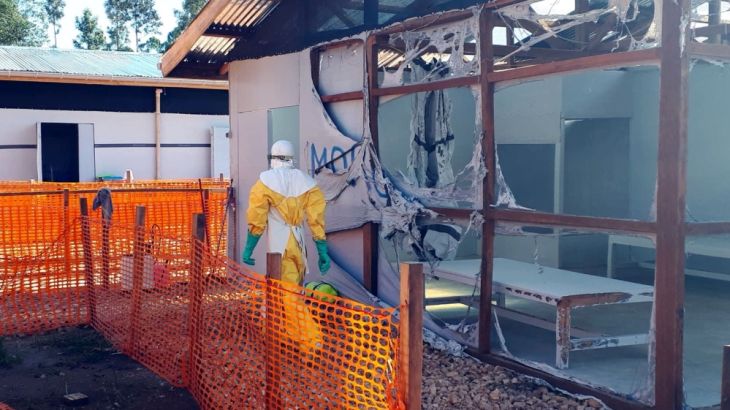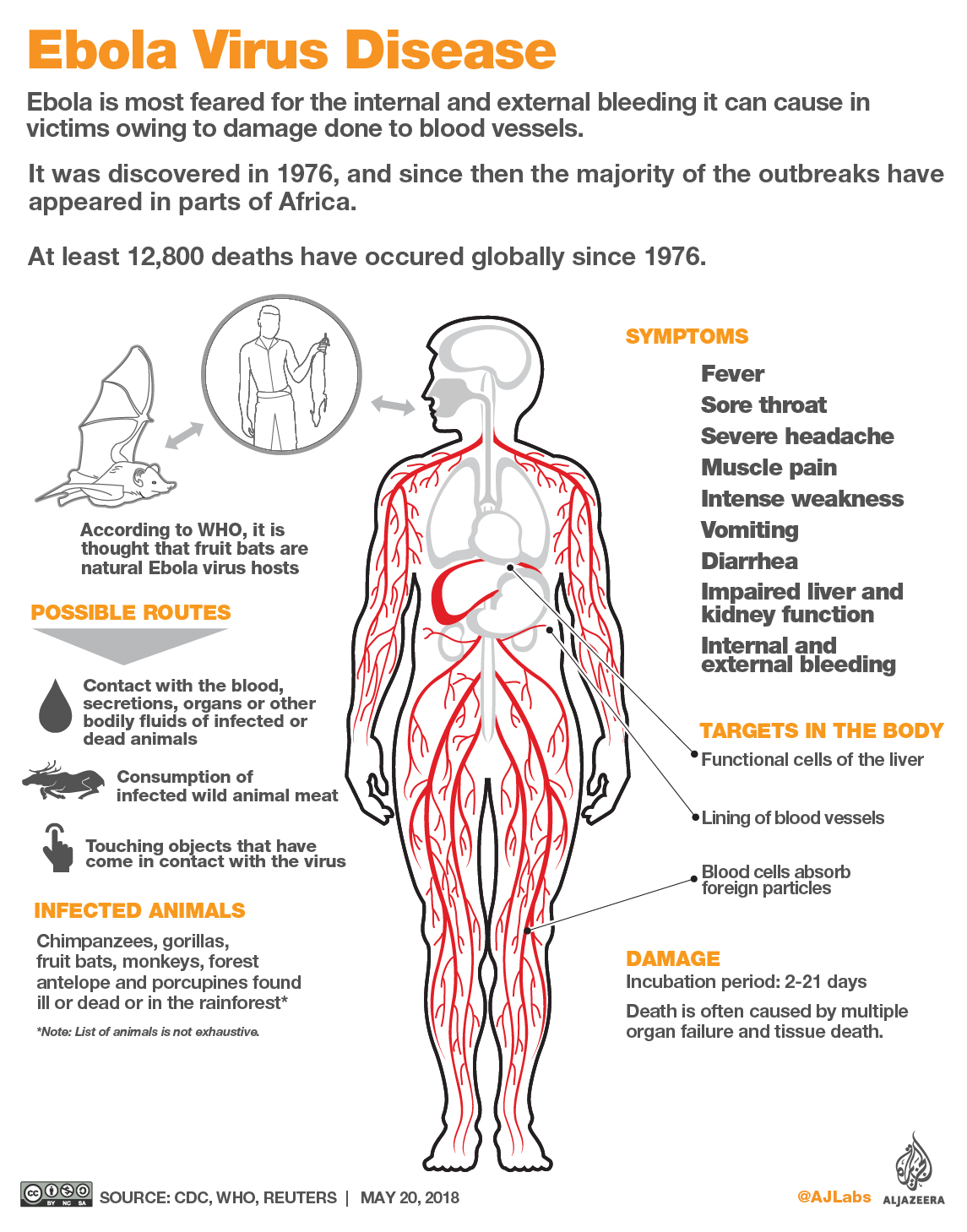‘Toxic’ atmosphere undermining DRC Ebola outbreak response: MSF
Medical charity raises alarm over ‘deepening community distrust’ as deadly epidemic continues to claim lives.

The battle to beat Ebola in the Democratic Republic of Congo (DRC) is failing, medical charity Doctors Without Borders (known by its French initials, MSF) has warned, with health workers unable to bring the epidemic under control amid “a climate of deepening community mistrust”.
Seven months into the largest-ever outbreak of the deadly virus in the DRC, “various political, social and economic grievances” and an overly militarised response are impeding efforts to combat its spread, MSF said in a statement on Thursday.
Keep reading
list of 4 itemsUganda declares end of Ebola after 4-month outbreak
Uganda’s Ebola outbreak nearly under control, says Africa CDC
Ebola vaccines produced lasting antibodies during trial: Studies
“A range of issues have led to these tensions: from the massive deployment of financial resources focussing only on Ebola, in a neglected region suffering from conflict, violence and long-standing health needs; to elections being officially postponed due to the Ebola outbreak, exacerbating suspicions that Ebola is a political ploy,” MSF said.
The DRC’s current Ebola outbreak, its tenth to date, has killed at least 569 people.
It emerged in eastern North Kivu province in August and later spread to the neighbouring Ituri province, both of which are wracked by intercommunal violence and unrest.
|
|
Amid the turmoil, health workers and emergency responders have struggled to win the cooperation of affected communities, many of which are deeply distrustful of the government and a roll-out of medical strategies – supervised by security forces – that have clashed with local customs.
Historically poor access to government-run health facilities has made care by traditional healers or self-medication the preferred healthcare option for many in the region, meaning a government-backed vaccination programme has often encountered local opposition.
Unidentified attackers last week torched two of MSF’s treatment facilities at the focal point of the epidemic, in the towns of Butembo and Katwa in North Kivu, prompting the charity to suspend its operations in the area.
The arson attacks were among dozens of other onslaughts against the Ebola response in the past month alone, according to MSF.
Divisions over strategy
The failure to overcome the ongoing epidemic has seen it evolve into the second-largest ever breakout of its kind, trailing an epidemic between 2013-2016 that killed about 11,300 people in West Africa as it surged through Guinea, Sierra Leone and Liberia.
The World Health Organization (WHO), which has coordinated an emergency response to the current flare-up alongside the DRC’s health ministry, likened its attempt to beat back the virus as a “steep uphill climb”.
MSF’s International President Joanne Liu, meanwhile, described the outbreak’s “indicators” as abnormal.
According to MSF, more than 40 percent of new cases since the beginning of the year pertain to people who died in the community, not in treatment centres.
“That means that we have not reached them, and they have not sought our care,” Liu said.
The charity said the epidemic would not end until authorities treated patients as “partners in the response” and increased efforts to “listen to their needs, not preach to or coerce them”.
It also raised the alarm over heavy-handed use of security forces in a region rampant with rebel fighters, which Liu claimed contributed to the creation of a “toxic” atmosphere.
MSF alleged that security forces had used “coercion” while overseeing safe burials, tracking contacts and assisting with the admission of patients to treatment centres.
“The use of police and armed forces to compel people to comply with health measures against Ebola is leading to further alienation of the community and is counterproductive to controlling the epidemic,” it added.
Jessica Ilunga, a spokeswoman for the DRC’s health ministry, said there was a “misunderstanding” about the role of security forces in dealing with the outbreak, however, and rejected MSF’s claims as a “gross exaggeration of the situation”.
“The police and the army are not involved in Ebola-response activities, and their role has never been to enforce sanitary measures,” Ilunga said.
“Contrary to international agents, local health workers don’t have the privilege of being evacuated when security conditions worsen. As such, it is necessary to reinforce the security to allow for smooth response operations,” she added.

WHO spokesman Tarik Jasarevic, meanwhile, said while it was “not ideal” for security forces to be present at treatment centres or during health workers’ visits to the community, “the WHO and partners must keep our workers safe”.
“It is a difficult balance to strike,” he added.
‘Cautiously optimistic’
Ilunga also said efforts to contain the outbreak had proved “quite positive”, pointing to success in keeping the disease “relatively contained” geographically.
She added there was a need for caution, however, given the “high mobility of the population” and the “spread of misinformation and rumours” about the medical response creating a risk of further infections.
“We can share the right messages, but if you have counter-messages, that makes it hard,” Ilunga said.
Ebola, which can cause multiple organ failure, is passed from human to human. Transmission may occur from contact with the mouth, nose, broken skin, blood or other bodily fluids of those infected. It has an incubation period of between two to 21 days, according to the WHO.
The DRC’s current outbreak has seen no new cases registered within 21 days in about half of the 19 health zones affected by the epidemic, Jasarevic told Al Jazeera, adding the figures provided authorities with a cause for “cautious optimism”.
“We have seen outbreaks end in areas where the communities have become engaged, from health workers to religious leaders to youth groups,” Jasarevic said.
“In every town, partners work with social scientists, anthropologists and local leaders to understand the context and tailor the approach to what works,” he added.
“No single approach or single organisation will end this outbreak … every pillar of the response continues, from contact tracing to vaccination.”